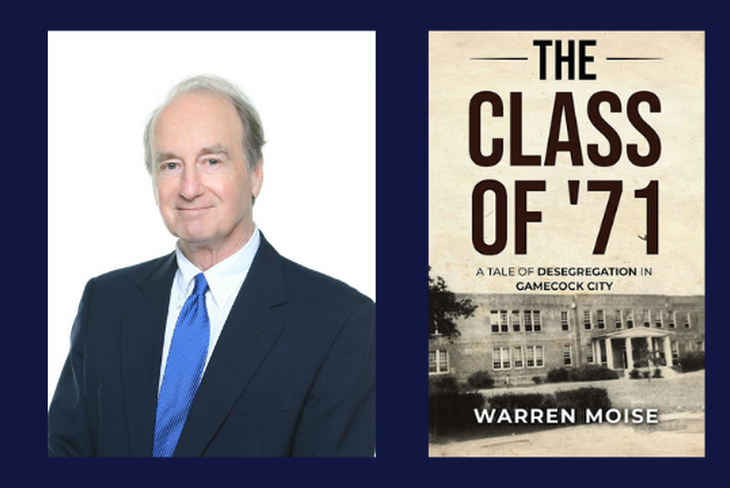Posted in: Lawyers › None

When Warren Moise, a trial lawyer at Grimball & Cabaniss in Charleston, decided to write The Class of ‘71: A Tale of Desegregation in Gamecock City, he knew it was a topic that should be preserved in history.
Author of several legal procedure books including So You’re Going to Try Your First Case and Credibility and Character Evidence in addition to his popular Beyond the Bar column in SC Lawyer magazine, Moise decided to take on a different type of writing with the recently released memoir and historical exploration of a key time in Sumter and the state’s past.
In 1971, Sumter’s senior class of Lincoln High School, a school with predominantly Black students, and Edmunds High School, a school with predominantly white students, were told with little notice desegregation was to begin immediately at the start of the school year. Prior to this change, students were legally allowed to choose which school to attend, but many chose not to.
This change brought out the best and the worst in people, but despite it all, the class of ‘71 worked together and rose above the challenges, Moise explains in the book.
We recently sat down with Moise to talk about what inspired him to tell this story and how this type of writing is different than what he has done in the past.
Q: Tell us a bit about yourself and what led you to your career in law.
A: I started tying The Class of ’71 into a life story here. I was born in Bishopville, but I grew up in Sumter. When we were born, there was total segregation and statutes in the state code that mandated that. Sumter was essentially like two separate little cities, which is just so weird when you think about it, but back in those days, there was a black city where white people never mixed with the population and vice versa. Eventually, total desegregation was put into place. I graduated with the Class of ’71, went off to the University of South Carolina for college, but only stayed for three semesters. I dropped out of school and went to play rock and roll music for 10 years with various bands. I came back after 10 years and had 48 hours left for my degree, so I went crazy and knocked those out. Then I graduated in 1985 with an undergraduate degree in history. In 1988, I graduated from law school, moved down to Charleston, and have practiced as a trial lawyer ever since.
Q: What was your biggest inspiration to write the Class of ’71?
A: My thought was that it was an amazing year in history because across the United States, it was somewhat similar to what we have going on today regarding racial tensions. I thought the senior class of ’71 was just so different from these other cities, and even though there was a little fighting that went on, there was no severe violence such as burning down stores or flipping vehicles. We did the best that we could with desegregation, and it was the students who did it and not the adults. The kids essentially had to figure desegregation out because nobody else, such as the legislature, would do it for us. I thought we did a great job of pulling off this integration from the bottom up and that it’s something that should be remembered and not forgotten.
Q: What did you learn throughout the process of writing this book?
A: I had to do a lot of research. There’s not much out there about this topic. There were the Sumter Daily newspaper archives and one or two thesis papers that locals had written. But other than that, there wasn’t that much out there for me to utilize. I called many former students, white and black, to get their opinions on what happened that year.
Q: How is writing a book different than a legal column or article?
A: Well, there is a big difference between those two. You don’t typically do book signings for a procedure book, and I’ve written several. A procedure book is also not something you put on your bedside table or take to the beach to read. But with The Class of ‘71, I had to promote it, and I’m proud that the book is readable and that it’s something you can enjoy. The book is so much more than just our first day of high school. It talks about what the community was like during this era, the politics that went on, and historical events that happened, such as students clashing with hate groups like the KKK and the release of Pee Wee Gaskins from prison.
Q: What did you enjoy most about writing this book?
A: I just like to write, and I had a topic that was a little bit different and that made it more enjoyable to write rather than a civil procedure book. I was interested in the topic and wanted to preserve this moment in history.
Learn more about Warren and The Class of ‘71: A Tale of Desegregation in Gamecock City on his website.
